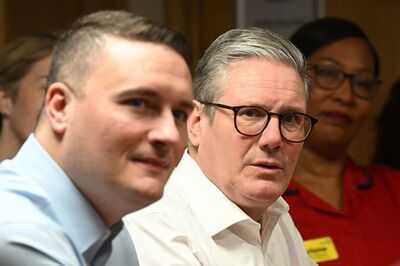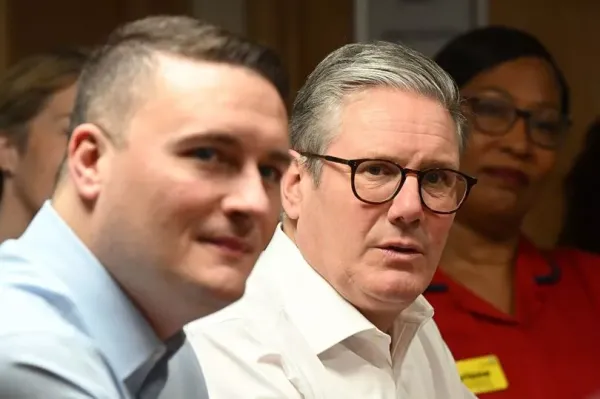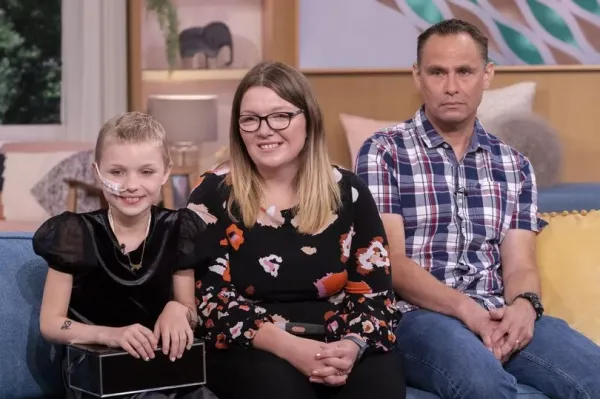
Wes Streeting has ordered that doctors “be vigilant” to rising cases of cancer in the young.
The Health Secretary has demanded a “culture change” in the NHS to ensure younger people are listened to when they present to GPs worried about cancer. It comes as rates of cancer in young adults haver been increasing since the early 1990s and is the biggest cause of death by illness for children under 14. His comments at an event in Westminster came on the day the Government launched the Children and Young People Cancer Taskforce.
Mr Streeting said: “It’s about being listened to as a patient and that is a cultural change that's needed in the . If the clinician doesn’t listen to you they are more likely to lose sight of what is really going on. If you are making assumptions about the patient in front of you - particularly young people with cancer because you’ve got a lower risk profile.
“Don’t dismiss what the patient in front of you is telling you about their lived experience - some change that they have noticed. Ask the questions. Be inquisitive. Do the investigation and don’t provide false hope and reassurance - ‘oh it’s not going to be cancer, you can’t have cancer.’
"It’s ‘low risk’, not ‘no risk’. This is about culture and an NHS that listens to its patients.”
Bowel cancer, which claimed the life of TV presenter Dame , is the leading cause of cancer death in men under 50 and second in women in that age group. Cervical cancer has seen rates drop for women in their 20s who received the HPV vaccine, but have increased for women ages 30 to 44. Cases of breast, prostate and endometrial cancer have all increased in young adults.
READ MORE:

Speaking at an event hosted by Macmillan Cancer, Mr Streeting said: “I think we should be extremely vigilant about the trends we are seeing in cancer diagnoses among young people. The lack of awareness is leading to later diagnosis in too many cases. I’ve had some interesting experiences in the last six or seven months talking to people we've suffered far worse outcomes and in some cases families who’ve been bereaved because of the diagnosis being missed or not fast enough leading to a fatal outcome. So this really matters and that focus matters.”
Rising cancer in younger adults has been linked to poor diets and too much junk food, lack of exercise as well as exposure to toxins such as air pollution.
Mr Streeting was diagnosed with kidney cancer in 2001 after it was picked up by a routine scan when he went into hospital to have a kidney stone removed. Shortly after being given the all-clear he said: "I just count my lucky stars, really. I've lost a kidney but I've also got rid of the cancer. No chemotherapy, no radiotherapy."

The Government launched the Children and Young People Cancer Taskforce on Tuesday which is the result of three years of campaigning by Dame Caroline Dinenage MP and her constituent Charlotte Fairall, the founder of children’s cancer charity, Sophie’s Legacy. Charlotte’s daughter Sophie was diagnosed with Rhabdomyosarcoma in 2020 and tragically passed away a year later, aged just 10 years old. The formation of the taskforce had been
Dame Caroline, co-chair of the taskforce, said: “On World Cancer Day it should escape nobody’s attention that cancer is the biggest cause of death by illness for children under 14 in the UK. So I am thrilled that it has been confirmed that the Taskforce will resume its vital work improving the way we detect, treat and care for children and young people with cancer.”

Mr Streeting also said efforts to fight discrimination in the NHS being hampered by "misguided approaches" such as promoting "anti-whiteness". He insisted he wants to get back to the fundamentals of what equality means and that he stands by diversity, equity and inclusion (DEI) policies at a time when they are under attack. He said: "We've got to deal with these challenges against the backdrop at the moment, let's be honest, where equality, diversity and inclusion is under a lot of spotlight and discussion.
"Now, I could get quite a lot of plaudits from quite a lot of people across the country... 'You know what? NHS, tough times, I'm going to scrap all of those equality, diversity and inclusion people. We'll save loads of money doing that, and we'll divert the money into actual patient care'. Except, ask black nurses about their experiences of being bullied in the workplace in an organisation that has had black people in it since it was founded pretty much... Empire Windrush, NHS foundation, same year, that generation built the NHS.
"You look at outcomes: prostate cancer, black men twice as likely to die of prostate cancer than white men, black women three times more likely to die in childbirth than white women. We've got some real racial inequalities here."
Asked by journalist Nick Robinson if this was a political fight he was willing to have, he said: "Yeah, but I also need the profession to help. And sometimes there are some really daft things being done in the name of equality, diversity and inclusion, which undermined the cause. For example, there was one member of NHS staff who was merrily tweeting a job ad online and saying part of her practice was anti-whiteness.
"And I just thought, 'What the hell does that say to the bloke up in Wigan who's more likely to die earlier than his more affluent white counterparts down in London?' We've got real issues of inequality that affect white working class people."
Mr Streeting said the "ideological hobby horses need to go", adding that "what's been lost, I think, with some well-meaning but misguided approaches to equality, diversity, inclusion - the clue is in the name - it's equality, it should be applicable to everyone.”